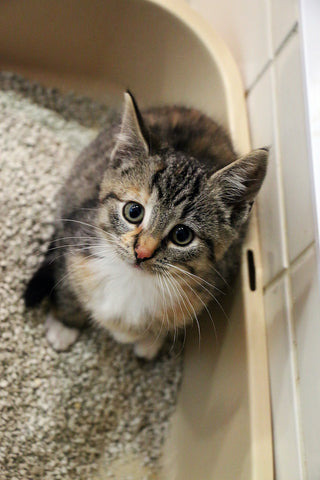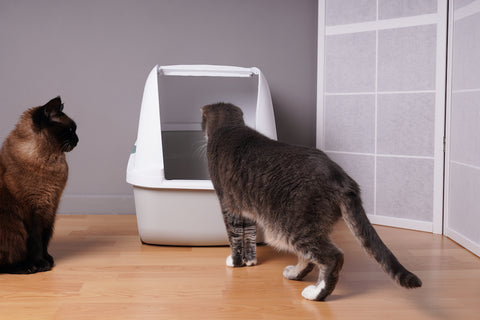Why is My Cat Laying in the Litter Box?
If your cat is laying in the litter box, it can be a cause for concern, as this behavior is not typical and may indicate an underlying issue.
In this blog article, we'll explore some of the possible reasons why your cat might be doing this and what you can do about it.

Is Your Cat Laying in the Litter Box? Understanding the Behavior
Cats are known for their quirky and often mysterious behaviors. From kneading blankets to chasing imaginary prey, they always seem to keep us guessing. However, one behavior that can be particularly perplexing for cat owners is when their furry friend decides to lounge in the litter box. If you've ever walked into your bathroom only to find your cat sprawled out in their litter box, you're not alone.
Litter Box as a Safe Haven for Cats
While it may seem counterintuitive to us, cats often view their litter box as a safe space. This behavior can be attributed to several reasons:
Comfort and Warmth: Litter boxes are typically confined spaces, which can provide a sense of safety and comfort for your cat. They may find the litter cozy and warm, making it an appealing spot for a catnap.
Stress Relief: Cats may retreat to the litter box when they're feeling stressed or anxious. It's their way of seeking refuge from perceived threats or changes in their environment.
Territorial Instincts: Cats are territorial animals, and they may use the litter box as a way to assert their dominance over their designated space.
Medical Issues: In some cases, cats with urinary tract problems or gastrointestinal discomfort may associate the litter box with relief. This can lead them to spend more time in the box.
When to Be Concerned?
While the occasional visit to the litter box for a quick rest might not be a cause for concern, there are situations where you should be vigilant:
Change in Behavior: If your cat's litter box lounging is a new behavior, it's important to rule out any underlying health issues. Sudden changes in behavior can be a sign of pain or discomfort.
Excessive Time Spent: If your cat is consistently spending extended periods in the litter box, it's time to investigate. Cats should not be living in their litter box.
Accompanied by Other Symptoms: Keep an eye on other symptoms such as changes in appetite, vomiting, or litter box avoidance. These signs could indicate a medical problem that needs immediate attention.
What You Can Do?
Observe Your Cat: Pay close attention to your cat's behavior, looking for patterns and triggers. Is there a particular time of day or event that precedes the litter box lounging?
Provide Comfortable Alternatives: Offer your cat comfortable and cozy spots to rest. Cat beds, blankets, or heated pads can make attractive alternatives to the litter box.
Stress Reduction: If your cat's behavior is stress-related, work on reducing sources of stress in their environment. Ensure a stable and predictable routine, and use feline-friendly pheromone sprays to create a calming atmosphere.
Consult a Veterinarian: If you suspect any health issues, consult your veterinarian promptly. They can perform a thorough examination to rule out medical problems.

Cat Comfort Zones: Tips for Encouraging the Right Relaxation Spots
Cats are creatures of comfort and routine. They enjoy finding cozy spots to relax and unwind, and as a cat owner, it's your responsibility to create an environment that supports their need for comfort and relaxation. If you don't want your cat to sleep in the litter box, you should create alternative spaces for your cat.
Provide Cozy Bedding:
One of the simplest ways to create a comfortable space for your cat is by providing cozy bedding. Soft blankets, plush cat beds, or even a well-placed cushion can be an inviting spot for your cat to lounge on. Ensure the bedding is easy to clean, as cats can be particular about hygiene.
Choose Warm and Sunny Spots:
Cats love warmth, so find areas in your home where sunlight streams in during the day. A sunny windowsill or a cozy spot near a heater can be perfect for a cat's relaxation. Ensure there are soft surfaces for them to curl up on in these spots.
Consider Elevated Perches:
Cats adore being up high. Install cat trees, shelves, or window perches to give your cat the opportunity to survey their kingdom from above. These perches offer both a cozy space and a vantage point for observing their surroundings.
Create a Safe and Quiet Retreat:
Cats often seek refuge in quiet, safe spaces. Provide hiding spots like covered beds, igloos, or even cardboard boxes with soft bedding inside. These areas can make your cat feel secure, especially in a busy household.
Use Cat-Friendly Furniture:
Cat owners are no strangers to feline furniture, such as scratching posts and cat trees. These not only serve as great places for exercise and play but also provide a sense of comfort and ownership for your cat.
Incorporate Catnip or Pheromones:
Catnip can be sprinkled on or near their relaxation spots to make them more enticing. Additionally, cat-calming pheromone diffusers can be used to create a calming atmosphere in your home.
Personalize Their Space:
Every cat is unique, and what one cat finds comfortable, another may not. Pay attention to your cat's preferences and adjust their relaxation spots accordingly. Some cats like solitude, while others prefer to be near their humans.
Regular Maintenance:
Keep their chosen relaxation spots clean and well-maintained. Regularly wash bedding, vacuum around their lounging areas, and ensure there are no irritants or obstacles in their chosen spots.
Respect Their Boundaries:
While it's essential to encourage cozy spaces, it's equally important to respect your cat's boundaries. If they prefer certain areas in your home, allow them to have their personal space without intrusion.
Creating comfort zones for your cat is about understanding their needs and providing the right spaces for them to relax and feel secure. By following these tips, you can ensure that your feline friend has a home filled with inviting, comfortable spots where they can unwind, destress, and enjoy their days to the fullest.
Leave a comment
